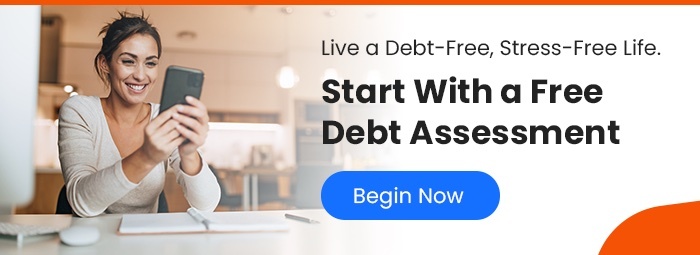
We’ve all heard that debt impacts our relationships, but it can also be a toxic relationship in and of itself. Are you losing sleep over debt? Getting relentless collection calls? Feeling frustrated, like you can’t move forward? Sometimes a relationship simply isn’t worth saving and you need to realize it’s time to move on. So, let’s break up with debt once and for all in eight simple steps.
Step # 1: Find out exactly what you owe
Losing sleep over your debt is a sure sign of financial difficulties. Resolve to sit down and take a close look at the debt you’re carrying. Determine the total amount of your secured debt (including your mortgage, car loan, etc.) and unsecured debt (such as credit cards and student loans). Also, be sure to add up what you’re paying each month toward your debt payments. For a real eye opener, you can also look at what you are paying each month in interest charges.
Step # 2: Determine your monthly income and expenses
You also need to determine how much money you have coming in and how much you’ve got going out on a monthly basis, so you know what funds are available to make your monthly debt payments. Be sure to work with your net income, or “take home pay.” This is the amount you receive after any deductions have been taken out. Next, subtract your monthly expenses. To get a handle on them, check out our story 15 Ways to Organize Your Spending.
Step # 3: Adjust your spending plan or budget
You need to make at least the minimum payments on your debts each and every month—and on time if you want to maintain a good credit score and avoid late fees. But try to find extra funds in your spending plan and/or budget, so you can increase your debt payments. Look at your expenses and see if there are areas where you can cut back or find cheaper alternatives. Download our Monthly Budget Tracker to see exactly where your money's going, and use our Budget Calculator to determine how much you can save by cutting out a couple of items from your budget. You may find you're spending money in areas that you don’t really need to.
Step # 4: Consider different repayment strategies
You can use our Debt Calculator to see how long it will take you to pay off all your debts and how much you’ll pay in interest just by making the minimum monthly payment or a fixed monthly payment. The calculator will also show you how that compares to other repayment strategies, like the snowball and avalanche methods. You may be able to save thousands in interest and pay off your debt sooner just by increasing your monthly payments. It might be worth buying a few less lunches each month, or taking on a side hustle or part-time job.
Step # 5: Use any extra funds to pay off debt
It might be tempting to use “extra” money to buy a treat but if you are carrying debt, use any extra funds, like your tax return (or at least part of it) or overtime funds, to pay down your debts. Once you are free from debt, you can then truly enjoy that extra money.
Step # 6: Avoid new debt
Have you ever ended a relationship and rebounded with another person who was just like your ex? If we don’t make a conscious effort to change, we tend to keep making the same mistakes over and over again—not just in relationships but with our finances, too. If you’re going through all this trouble to break up with debt, don’t take on new debt. Put your credit cards away and learn to use cash only. Follow your monthly spending plan and live within your income. Not only will this give you a great sense of control, you also won’t be increasing your debt load.
Step # 7: Consider a low-interest loan
If you’re hitched to bad debt, see if you can change it to better debt. Check with your bank or credit union to see if you qualify for a loan (like a debt consolidation loan) with a lower interest rate than you're currently paying. The lower the interest, the sooner you can pay off your debts, especially if you can increase your monthly payments.
Step # 8: Just do it
There’s no point in staying in a bad relationship, so why prolong it? If something isn’t working, it’s best to deal with it sooner rather than later. (Why delay your happiness?) By dealing with your debts before they get too out of hand, you can have an amicable divorce rather than one of those nasty ones.
Break up with debt. Make up with life.
If you can’t deal with your debts on your own or you’ve been denied a loan, it’s time to consider some professional, non-profit help. Make an appointment with one of our certified credit counsellors and tell them you’re ready to live debt-free—the appointment is free and completely confidential. The counsellor will present you with all of your available options (like our Debt Consolidation Program) and the pros and cons of each, so you can decide what's best for you. And remember, you don’t have to do this on your own—we’re here every step of the way to help you feel empowered.
Once you overcome your toxic relationship with debt, keep moving forward in a positive way. Don’t go back to old money habits or ideas that no longer serve you. Carve out a new relationship with your finances and debt, and you’ll live happily ever after.

Frequently Asked Questions
Have a question? We are here to help.
What is a Debt Consolidation Program?
A Debt Consolidation Program (DCP) is an arrangement made between your creditors and a non-profit credit counselling agency. Working with a reputable, non-profit credit counselling agency means a certified Credit Counsellor will negotiate with your creditors on your behalf to drop the interest on your unsecured debts, while also rounding up all your unsecured debts into a single, lower monthly payment. In Canada’s provinces, such as Ontario, these debt payment programs lead to faster debt relief!
Can I enter a Debt Consolidation Program with bad credit?
Yes, you can sign up for a DCP even if you have bad credit. Your credit score will not impact your ability to get debt help through a DCP. Bad credit can, however, impact your ability to get a debt consolidation loan.
Do I have to give up my credit cards in a Debt Consolidation Program?
Will Debt Consolidation hurt my credit score?
Most people entering a DCP already have a low credit score. While a DCP could lower your credit score at first, in the long run, if you keep up with the program and make your monthly payments on time as agreed, your credit score will eventually improve.
Can you get out of a Debt Consolidation Program?
Anyone who signs up for a DCP must sign an agreement; however, it's completely voluntary and any time a client wants to leave the Program they can. Once a client has left the Program, they will have to deal with their creditors and collectors directly, and if their Counsellor negotiated interest relief and lower monthly payments, in most cases, these would no longer be an option for the client.







